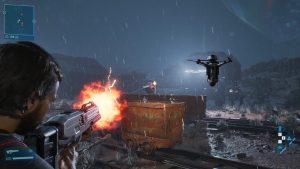
MindsEye Lead Actor Criticizes Release of Unfinished Games at Full Price
Following the troubled launch of the highly anticipated open-world game MindsEye, lead actor Alex Hernández has spoken out publicly against the practice of releasing unfinished games at full retail price. In a recent interview, Hernández expressed strong concerns about the industry trend, calling it damaging to both players and a studio’s long-term credibility.
A Rocky Start for a Promising Title
MindsEye, developed by Build a Rocket Boy and led by former Grand Theft Auto producer Leslie Benzies, debuted earlier this month to considerable hype. Available on PC, PlayStation 5, and Xbox Series X|S, the title had been marketed as a cinematic, story-driven open-world experience that would rival genre heavyweights. However, the game’s release was met with swift criticism, with technical issues, bugs, and performance setbacks dominating early player feedback.
On Steam, MindsEye quickly slipped into a “Mostly Negative” review status, with a player count that peaked at fewer than 4,000 concurrent users. The game’s instability, paired with the studio’s decision to withhold early review copies, created a sense of mistrust among consumers. Compounding the backlash were statements from the developers suggesting that the early negativity may have been caused by “paid bots,” a claim that was met with widespread skepticism.
Alex Hernández Speaks Out
Amid the response, Alex Hernández offered a rare and candid perspective from someone closely involved with the project. In a conversation with Check It TV, the actor criticized the full-price release of a game that was not ready for market. He emphasized that the development team had worked hard and with care, but ultimately the decision to release the game in its unfinished state came from above.
Hernández stated that this model, where companies launch flawed products with the promise of fixing them after release, is one that ultimately harms player trust. He suggested that studios should instead embrace early access as a viable option, allowing players to enter a work-in-progress with appropriate expectations. According to him, this approach is more transparent, more honest, and likely to result in better long-term relationships between developers and players.
Developer Reaction and Studio Challenges
Build a Rocket Boy has since acknowledged the criticisms and has pledged to address many of the performance issues in the coming weeks. The studio is reportedly working on patches that will improve CPU and GPU performance, refine user interface elements, and resolve gameplay bugs. Despite these efforts, the damage to the game’s reception may already be significant.
Reports have emerged suggesting internal turbulence within the company, including a formal consultation process that could result in layoffs affecting more than 100 employees at the UK studio. While the developers remain committed to supporting the game post-launch, the initial reception has cast a long shadow over what was once positioned as one of the most anticipated titles of the year.

A Broader Industry Conversation
Hernández’s remarks have added fuel to a larger conversation in the gaming industry about how and when games should be released. His criticism touches on a broader sentiment shared by players and developers alike, who are growing increasingly frustrated with rushed releases that prioritize sales targets over quality assurance. His perspective, as someone who participated in the creative process and yet remains unafraid to speak frankly, brings attention to an issue that continues to affect even high-profile titles.
While it remains to be seen whether MindsEye can recover its standing with players, the conversation around its launch has clearly extended beyond the game itself. It has become part of a larger reckoning within the industry about transparency, development cycles, and the value of consumer trust.
